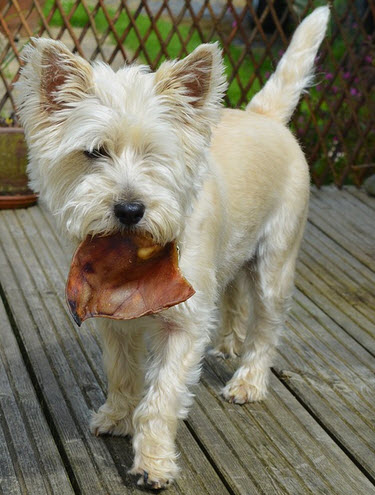


Puppy with pigs ear. Picture provided courtesy of aspca.org
Bringing how a new puppy is exciting for any family. That sweet bundle of fur will bring lots of happiness to any home.
But before bringing home your new puppy you need to make some preparations. The first is deciding what you’ll feed him.
You don’t want to make any sudden changes in your puppy’s diet so find out what type of food the breeder or rescue center was using. Try to stick with the same food at first to prevent unsetting your puppy’s digestion.
If you prefer a different kind of food then switch it gradually by mixing half of the new food with half of the old. Continue to add a larger percentage of the new food each day until you’ve made the change. This should take seven to ten days.
If you’re going to crate train your puppy it’s good to feed him inside his crate. This will make his crate seem like his home and a safe place instead of a punishment.
Set up a feeding schedule for your new puppy and stick to it every day. This will make housebreaking your dog easier.
A young puppy has a small stomach and will need to eat three or four times a days. His schedule can be close to yours to make it simple to remember. Feed him at breakfast, lunch, late afternoon and dinner. Smaller meals are easier for your puppy to digest.
Remove uneaten food. This is especially true if your feed your puppy a BARF diet, Biologically Appropriate Raw Food. An exception to this rule is Chihuahuas who can suffer from low blood sugar. They should have food available at all times.
At six months old your dog can be fed only twice a day.
A puppy needs a high quality food that is higher in protein than adult dog food. Purchase a food that is designed for the special needs of a quickly growing puppy.
You don’t want to give your puppy cheap food that is filled with grain and fillers. This will not give him the nutrition he needs but will eventually cause weight gain.
Consider a breed specific formula that factors in the difference in needs between large and small breed dogs.
Dry food is usually the best option. Canned food is more expensive but contains a lot of water and salt. Moist food contains many preservatives.
Your vet can give you suggestions of the best brand of food to buy.
Your dog should always have access to fresh water. It should be changed often to prevent bacteria from forming. A bowl that attaches to the side of his crate reduces the chances of a spill.
Never feed your dog from the table. Not only will this result in bad behavior –he’ll constantly beg for food – but the food you eat is usually too spicy for his digestive system and will cause him an upset tummy.
Puppy’s grow a lot during their first year and have high energy so they need lots of food. Your vet will monitor your puppy’s weight and can tell you if you’re over feeding.
Remember, an investment in quality food can save you money in medical bills later on.